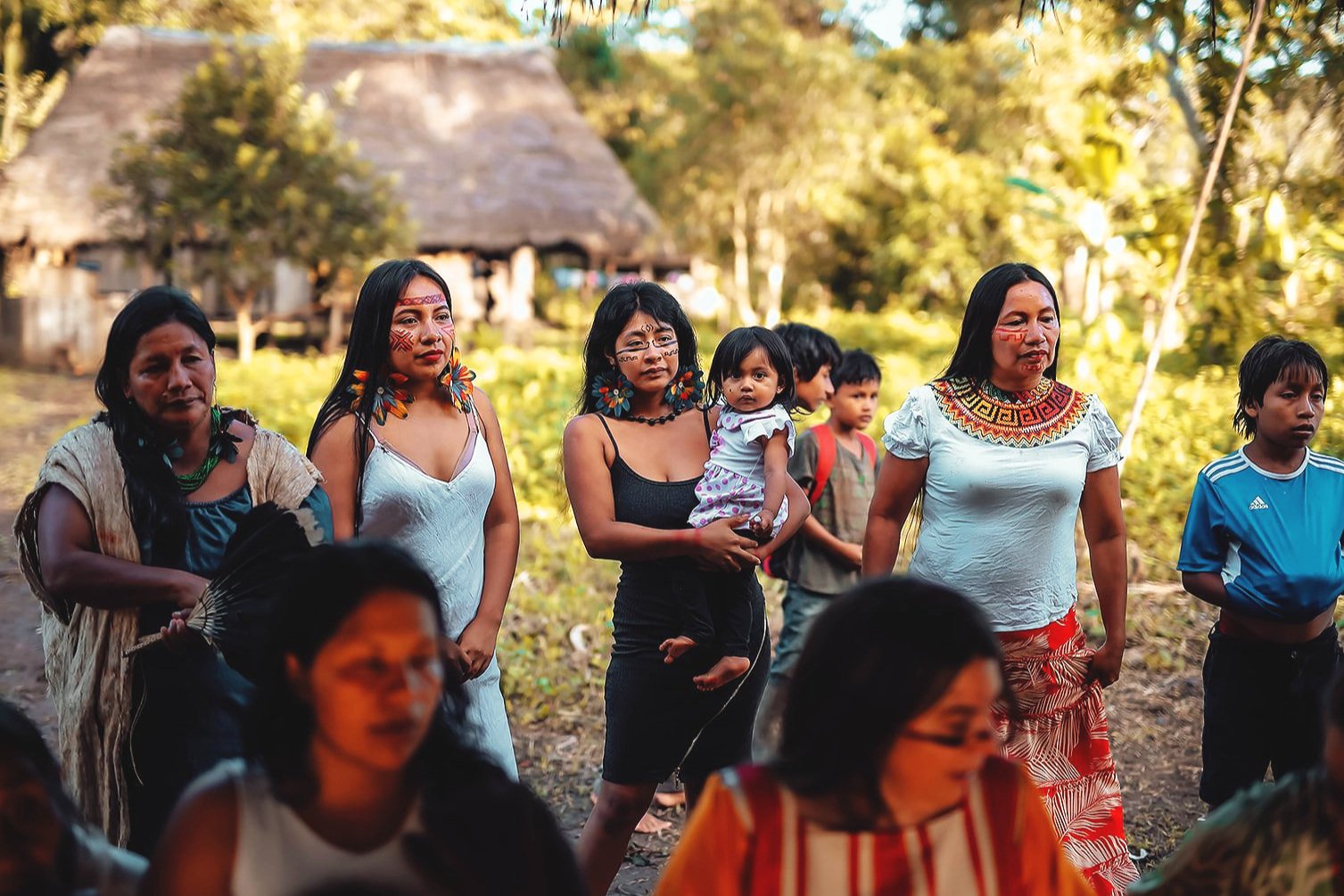
The Sapara People
Guardians of a living rainforest
and a wisdom the world cannot afford to lose.
Only two elders remain who speak Sapara fluently.
the
last
voices
The Sapara are one of the smallest Indigenous nations of the Ecuadorian Amazon guardians of roughly 900,000 acres of primary rainforest in Pastaza Province. Once numbering in the hundreds of thousands, today fewer than 600–700 Sapara remain, and only three elders still speak their ancestral language fluently. In 2001, UNESCO recognized their oral heritage as a “Masterpiece of the Intangible Cultural Heritage of Humanity,” underscoring what is at stake: when a language disappears, an entire library of the forest vanishes with it.
To speak Sapara is to remember that the forest is alive: rivers carry memory, trees breathe, and dreams are instruction. The last fluent speakers hold ecological knowledge encoded in stories, plant names, and ceremonial language knowledge that cannot be replaced by translations alone.
Kamunguishi Declaration
A forest home for our continual renewal
A message for a planet in ecological crisis from the Sapara Nation. The Sapara wrote this declaration in the heart of the Amazon, beside a sacred tree, among women, men, friends, and children.
Inscribed on the UNESCO Representative List of the Intangible Cultural Heritage of Humanity
We, the Sapara Nation, have, over the generations, lived through a veritable “ecocide.”
We have lost a large part of the forest that nourishes our being.
Moreover, our language is on the verge of extinction and our beloved grandmothers and grandfathers, sisters and brothers, the wise ones who help us connect with naku, the world of the forest, are dying. In the midst of this darkness, we carry on, true to our ancestral mission to defend at all costs this world called naku, in recognition that the forest is a vital source for our people and our planet.
The living world that nourishes and sustains us all is a forest. We are forest. Our task, goal, and destiny as Saparas is to be faithful to the teachings that come from the forest; to live our lives fully by them, and to transmit these so that they can reach the entire planet, with the goal of discovering a new connection with the forest that makes and surrounds us.
This Kamunguishi Declaration is the message we transmit with all our being for the good of the planet. It is a guide for these times of ecological crisis in which we are living today.
The message is simple:
The world is one –nukaki.
The world is forest –naku.
The fragmentation of this world happens when the material part becomes separated from its spiritual foundation. The grave error of the modern epoch consists in forgetting the spiritual part and only focusing on the material, treating the so-called natural world as if it were a mere resource.
This separation has had serious consequences for the wellbeing of our planet.
By saying, however, that the world is forest, that the world is naku, we wish to say that the world that surrounds, holds, and sustains us all is made up of selves –persons– who communicate among themselves and with us. These beings are spirits (tsawanu), and, being part of that world, we too are spiritual beings. The world called forest is a whole at the same time that it is made up of innumerable beings producing a profusion of knowledge: the forest is a single totality and also a multitude.
The task of the Saparas is to maintain open the lines of communication with the tsawanu side that holds and sustains the world, and, in that way, to remake from the fragments of everyday life, a whole. In our lives we need to learn again to return to the spiritual foundation that animates all life, so that it can serve as a guide for a future buen vivir (witsa ikichanu). This requires a daily practice. One needs to know how to work with dreams as well as with the visions given to us by our medicinal plants, since these are the paths that lead directly to the domain of the spirits.
Naku, the forest world, is rejuvenated in a place our elders, the ishyawnashimanujinya, named Kamunguishi. Kamunguishi is a large expanse at the center of Sapara territory. It is made up of sacred forests and lagoons of unparalleled diversity. Although we defend it with our entire being, Kamunguishi is not a “reserve,” given that this word alludes to a space that is kept separate from human activity and conserved as an eventual source of resources. It is, rather, a home. Kamunguishi is the forest home for our continual renewal.
Kamunguishi is crisscrossed by the fire-strewn path of the Burning Anaconda, the Anamishuka Saweraw, the being in charge of reviving the Earth when she begins to lose her balance. Oil extraction is the principal cause of this imbalance. It makes the Earth begin to die, given that maintaining oil in its proper place, underground, is necessary for the well- being, the witsa ikichanu, of the planet. It is for this reason that we prohibit all forms of extraction on our territory.
We, the sons and daughters of the forest, the dream-travelers, make our way to Kamunguishi to listen to its beings and their messages. This is where we are reborn to its life. And it is there where we go to live, learn, and assure that its story will also be ours. And by telling that story we will be able to right the thoughts of those who listen, and in this way, orient their paths.
Kamunguishi is the heart (winjya) of forest life. It is the source for a planetary rejuvenation.
Kamunguishi, in sum, is our spiritual university, our temple in the forest. Under the shade of its immense trees –Samiki, Suyawna, Tsawanatuka– it teaches us how to live. Under the care of its guardian jaguar-dogs, we find the right path, a path that is maintained by the beings of the forest –the kananakuhinya– who guide us through life’s meandering ways.
By means of the dreams of yesteryear their beings fix our ways and our intentions. Reminding us: “This is how it has to be. This is how we have to care for it.” Reminding us:
“The world is one – nukaki; the world is forest –naku; this is how it is.”
A Way of Life in
Harmony with the Forest
For the Sapara, the rainforest is not a resource; it is kin. Their ethic is reciprocity rather than extraction, and wellbeing is measured as balance between body, spirit, and territory. This is not a philosophy on paper it is daily practice: how food is grown, how healing is conducted, how conflicts are resolved, and how decisions are made. This lifeway has safeguarded biodiversity across their territory for generations.
“We Sapara are connected with the trees, and through that connection, we care for each other.”
the language
of dreams
Dreams are councils. Leaders are trained dreamers. In the predawn hours, families gather to recount dreams that guide planting cycles, diagnose illness, mark animal migrations, and resolve disputes.
Through dreaming, the Sapara maintain an active dialogue with the intelligence of the forest what they describe as samai, the sacred breath animating all life.

Territory: a living sanctuary under pressure
The Sapara’s titled territory spans approximately 360,000–376,000 hectares (around 900,000 acres) of pristine, primary rainforest one of the most biodiverse and intact ecosystems remaining in the Ecuadorian Amazon. It is a living sanctuary of headwaters, clay licks, jaguar corridors, ancient trees, and medicinal plant groves, forming part of the planet’s lungs and stabilizing regional climate patterns.
This forest has never been industrially logged or mined. It breathes in balance with the people who have protected it for millennia. Yet despite its ecological purity, overlapping oil concessions and extractive interests continue to threaten both the territory and the culture it sustains.
The Sapara Nation has stood firm in defense of their land, rejecting extractive projects through collective assemblies and international advocacy. To protect the forest is to protect a living being one that remembers, nourishes, and dreams through those who still speak its language.
Regeneration
in practice
Sapara-led initiatives model Indigenous regenerative economies rooted in reciprocity:
— Community-owned eco-tourism that funds cultural revitalization while limiting impact.
— Agroforestry (cacao, medicinal plants, and forest foods) designed to strengthen forest health and food sovereignty.
— Women-led cultural work and artisan collectives that transmit language, story, and ceremony to the next generation

“It hurts us when this land is destroyed… because we live from it, sleep with it, and it protects us.”
Language, culture, future
UNESCO’s designation is both an honor and a warning. With only two fluent speakers remaining, every recording session, every class, every child’s bedtime story becomes part of a race against time. Protecting Sapara land and funding language revitalization are inseparable goals: forests store carbon; languages store meaning. We need both to survive.
Why This Matters
(At a Glance)
900,000 acres of pristine Amazon rainforest are cared for by the Sapara Nation — one of the most biodiverse ecosystems left on Earth.
Fewer than 700 Sapara people remain, with only two elders still fluent in the ancestral language.
Their oral traditions were recognized by UNESCO in 2001 as a Masterpiece of the Intangible Cultural Heritage of Humanity.
Their territory has been repeatedly targeted by oil blocks, yet Sapara assemblies have consistently refused extraction, choosing protection over profit.
A Question We Must Ask
Why do we wait until a forest is burning, until a language is silenced, before we call it urgent?
The Sapara are protecting one of the last untouched lungs of our planet, not for themselves alone, but for all of us.
Their way of life is a living model of balance, reciprocity, and climate resilience.
If we wait until it’s gone to act, we lose not only the forest
we lose the wisdom that remembers how to live with it.





